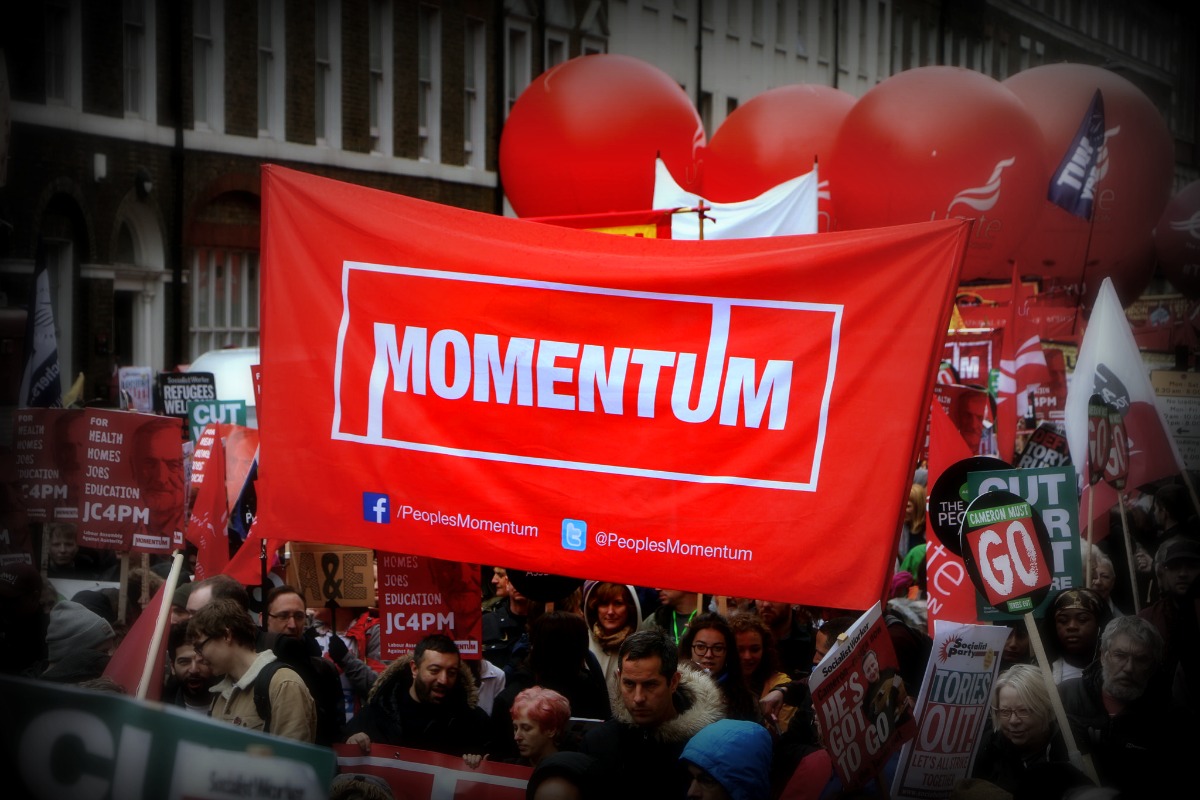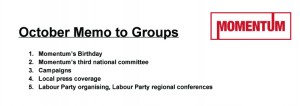Carla Roberts of Labour Party Marxists reports from the November 5 meeting of members of the Momentum national committee
Thirty-four people, including observers, attended the unofficial meeting for members of Momentum’s national committee, which was held in Birmingham on November 5 on the initiative of Matt Wrack, general secretary of the Fire Brigades Union.
This a was an important attempt to stand up to the decision by a small majority at a hastily called emergency meeting of the Momentum steering committee on October 28 to cancel an official meeting of the NC, which was supposed to take place on November 5 and make decisions on how Momentum’s first ever conference in February should be run. Instead, the SC – by a vote of six to three – decided that it should also make one of the most crucial decisions on the matter: namely, that conference should be organised not on the basis of local delegates, but ‘one member, one vote’ of the entire membership. A coup, in other words.
No wonder then that Momentum regions and branches up and down the country were livid. They had, after all, held meetings to discuss and make – mostly critical – amendments to the proposals put out by the Momentum office in early October on how to run conference. In the absence of a ‘horizontal’ line of communication between Momentum members or branches, it is difficult to know precisely what all the regions and branches decided, but, judging from posts on Facebook and the occasional report or set of minutes published, it looks like most regions favoured changes to the proposals (which, it should be stressed, did not come from the elected steering committee itself, but from Jon Lansman and a couple of his allies on the SC).
For example, many regions criticised the Omov plans and instead argued either for a delegate conference or a ‘hybrid’ and there were lots of proposals to lower the threshold needed to submit motions to conference. According to Lansman’s suggestion, a motion would need the support of 1,000 members before it could be heard at conference – an impossibility for any motion that is not supported and pushed by those having access to the database. The proposals criticising such nonsense seem to be the real reason why the NC was cancelled.
Immediately after the cancellation was announced, four Momentum regional conferences, a number of branches and dozens of individual members protested loudly against the move. Bourgeois newspapers quickly picked up on the “looming split” in Momentum, which in turn led John McDonnell to call an emergency meeting between comrades Lansman and Wrack to sort out the mess and limit the damage. Together they drafted a statement that was put to the SC on November 2 and initially attracted the unanimous support of its members. (Jill Mountford has since recanted, as “I woke up in a cold sweat and thought, I shouldn’t have signed this”, she said in Birmingham – though it is probably more likely that the cold sweat was down to a phone call from the leadership of the Alliance for Workers’ Liberty, of which she is a member).
The new statement, which “recognises and regrets the discontent and frustration felt by Momentum members in recent days”, gives some ground to the opposition by confirming that a new NC meeting will take place on December 3 and partially retreating on the voting arrangements for conference: “There will be both a physical delegates conference to thoroughly debate proposals submitted from the membership, and then Omov voting on the proposals in the period after the conference. The details of this procedure will be determined over the coming week.”
Yes, good luck with that. There was no such recommendation forthcoming at the Birmingham meeting – and it is doubtful whether there is any way the two methods can be combined, despite half of those present on November 5 arguing for a “hybrid”. More on that below.
Mess
Although the November 2 statement undoubtedly reduced the number of those travelling to Birmingham three days later, there was clearly still a strong desire to discuss what had happened and how similar undemocratic moves by a small leadership (whose democratic credentials are shaky, to say the least) can be avoided in the future.
Eighteen of the attendees at the November 5 meeting were members of the national committee. The AWL had four comrades present and there was a member each from the Labour Representation Committee, Red Labour, Socialist Appeal and Labour Party Marxists. A journalist from Socialist Worker was shown the door before the start of the meeting and, after a brief discussion, a member of the Socialist Party in England and Wales was also barred from attending.
Four members of the Momentum steering committee were present: Jackie Walker, Matt Wrack, Jill Mountford and her AWL fellow traveller, Michael Chessum. But because of the outrageous decision by the AWL to effectively support the right’s witch-hunting of comrade Walker by demoting her from the position of vice-chair of Momentum on the initiative of Jon Lansman, there is clearly a lot of bad blood between those four ‘left’ members on the SC.
Funnily enough, as the first speaker of the day, Jill Mountford started off by saying that “we shouldn’t turn on each other and witch-hunt each other”. Clearly, that was not meant as an apology to Jackie, but was perhaps intended as an attempt to stave off criticism of the actions of her own organisation.
But Jackie made her displeasure known, complaining, “The things that have happened to me have created a culture that has made the current move possible.” Too right. She was also self-critical: “Some of us have been coerced into supporting things that we wouldn’t have otherwise supported” – for example, the “lack of democracy within Momentum has been present for a long time”.
Comrade Wrack described an organisational “mess”, with “badly planned and badly run” meetings of the SC, where “outcomes are unclear and it is even less clear who will act to implement which decision”. There is a real discrepancy between the elected officers and the staff in Momentum office, “who don’t come from a labour movement background” and don’t know “that they are supposed to put into action the decisions that the elected officers have made”. He warned that this “tyranny of structurelessness” means that “people get away with all sorts”.
Speaker after speaker shared stories about the lack of democracy and, crucially, the inefficiency of the organisation. A comrade from Worcester told us how for months he pestered the office for contact details of other Momentum members locally, so he could set up a group: “Now I know there were six of us doing exactly the same thing at the same time. We all got the same reply from Momentum: silence.” Some of them actually bumped into each other when they were distributing Momentum leaflets at the same event.
Of course, Jon Lansman and his allies on the SC have used the fact that about a third of Momentum members are currently not organised in branches as a reason to push through Omov. In fact, like so many problems with the organisation, this is the fault of the leadership of Momentum, which is clearly not facilitating the organisation of local groups. If anything, the opposite is taking place: local groups are not allowed to send out their own emails (they all have to go through Momentum nationally), they do not receive a penny from the dues of 20,000 members and are often discouraged from organising activities.
Nevertheless, despite the obvious democratic deficit at all levels, there is clearly no desire to “split Momentum”, as had been reported. “I am here because I am convinced we still have everything to play for within the organisation”, said Matt Wrack. “We can’t throw this opportunity away and this assessment colours my whole tactical approach.”
A range of proposals were put forward in a useful if rather wide-ranging brainstorming session on how to democratise the organisation in the run-up to conference: they ranged from the need to publish the SC’s minutes and to clarify that the steering committee is subordinate to the national committee; that a new SC should be elected at the next NC meeting; that the Momentum office should help setting up local groups; to, crucially, the need to challenge the current company set-up, which gives Jon Lansman as the sole director total control over Momentum’s database – and money. Michael Chessum told the meeting that he happened to be in the office when he “overheard that Momentum had given a substantial donation to the Jeremy for Leader campaign and had seconded staff and equipment”. Chessum is the treasurer of Momentum, we should add. He should – at least – have been informed of such a decision.
It seemed to me obvious that the four members of the SC who were present should take a lead in cohering these proposals into a range of motions that regions and branches could move locally in order to give direction to those calling for more democracy. However, there is so much bad blood between the four that this is not going to happen. So the proposals are now being shared online in rough format by those who attended the meeting, with people naturally stressing those things that they found most important. An unsatisfactory outcome.
OMOV
Very interesting – though with an even less concrete outcome – was the discussion on ‘Omov versus delegate structure’ for conference. Speakers correctly identified that there are “two distinct visions” for Momentum: One, personified by Jon Lansman, is the idea that getting Jeremy Corbyn elected was the main thing that Momentum should do. From now on, it should exist as a centrally controlled organisation with lots of money and lots of staff that can organise lovely Facebook campaigns. Members of such an organisation can occasionally be activated to organise phone banks when the next coup or general election comes – but otherwise are nothing but “silent foot soldiers”, as Jackie Walker put it. Omov probably does look attractive to all those members who have so far been denied a real voice in running the organisation as a direct result of the lack of democracy in Momentum, as one speaker put it.
The other vision was supported by pretty much everybody in the room. This understands that “we are not a Jeremy Corbyn fan club”, as Matt Wrack put it. According to this outlook, Labour lefts need to actively organise in every ward and every Constituency Labour Party in order to remake the whole party from top to bottom if we are serious about fighting for a socialist future. Jeremy Corbyn is not going to do it for us.
A top down conference, followed by an Omov vote some time later, is, of course, designed to support vision 1, whereas a delegate structure is based on the need for active branches, discussion and debate amongst members – vision 2. These two visions are now openly clashing, with Jill Mountford warning that “Jon Lansman could not be more dismissive of local groups. He utterly rubbishes them at every opportunity – that is no secret.”
Her fellow AWL traveller, Michael Chessum, unsuccessfully tried to calm the waters by insisting that “I don’t think a lot of it is an active conspiracy, but there are also a lot of genuine mistakes and cock-ups. I don’t want this to become too personalised around Jon Lansman, who is not just a control-freak. Let’s show some good will.” He was openly laughed at and stopped talking after noticing that “everybody is rolling their eyes at me!” “You are kidding yourself if you think that Jon Lansman has learned a lesson,” warned Jackie Walker.
She is right. Vision 1 and vision 2 are clearly incompatible. Which is why it is a shame that about half the attendees in Birmingham supported the idea that conference could be run on a “hybrid” between Omov and a delegate system. A few seem actual fans of Omov, though most seem to think that “the genie is now out of the bottle”, as the SC had already agreed on such a method. “Now we have to make it work, otherwise we will have an insurgency on our hands if we try to overturn this decision at the next national committee”, said comrade Chessum (to the disdain of some AWL members, who heckled him).
The devil, of course, is in the detail – how on earth would it work? Would those at the “physical delegates conference” vote on the proposals before them on the day? If so, what if the ‘clicktavists’ at home subsequently overturned the decision of those they had delegated, many of whom are actually running Momentum locally? Who is going to implement such decisions? Would that not make Momentum even more undemocratic and ineffective? Everybody at our meeting argued against such a use of Omov.
Overall, this was a useful gathering, but it painfully underlined the need for the left within Momentum to start organising. The recent ‘mass amnesty’ of those suspended by Labour and the real possibility of an early general election make it imperative that the left gets its own house in order. This is still somewhat hampered by the fear of some in the room that this could be seen as a “split” within Momentum (which nobody argued for) or the forming of ‘a party within a party within a party’ (which is, in fact, just what is needed).




